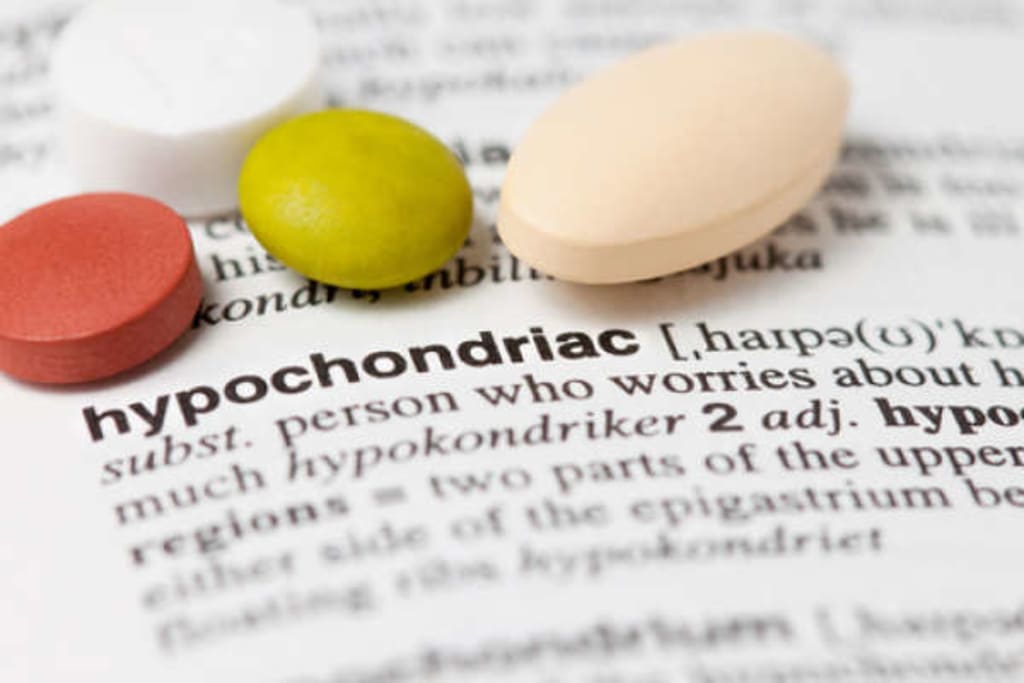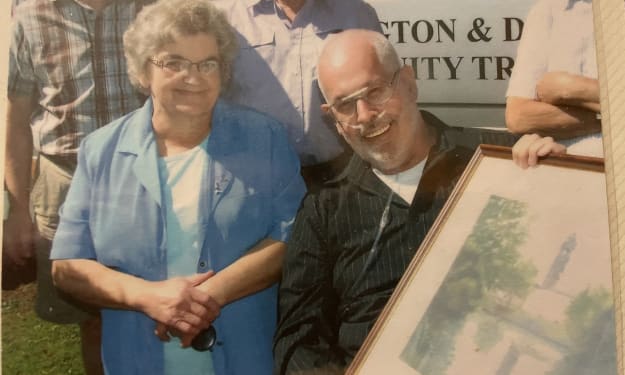Dealing With Severe Health Anxiety and Psychosomatic Symptoms
How I Experienced, and Learned to Cope With, My Fear of Blindness and Visual Distortions Exacerbated by Anxiety

From December 2017 - May 2018 I experienced months of severe, and some could say sudden, health anxiety symptoms which completely took over and ruined most parts of my life. That first sentence sounded very dramatic but I can't stress enough how debilitating it can be to be constantly convinced that you are seriously ill every second of every day. My anxiety (fortunately or unfortunately?) hooked on my ability to see and created a compulsive fear of going blind (which I later found out is called Scotomaphobia).
I never thought I'd be in a position to "retrospectively" write about my experience with health anxiety. I feel very fortunate that is the case but I am aware that I can easily fall back into old habits and I can identify my early warning signs. I'm also very fortunate to work as a mental health practitioner in the local NHS mental health services, so I had the prior knowledge even without therapy to help me on my way. Although I didn't regularly share my experience with colleagues, it's very comforting to work in an environment where mental health issues are so normalised, recognised, and understood.
I wanted to write this mainly to raise awareness because I think that I would have started to improve a lot sooner if I had known that someone else had experienced the same. Health anxiety is quite unique in its nature because it can commonly stem from someone's experience of real symptoms. People use the term "hypochondriac" very lightly in everyday life, and can sometimes be used in humour to take the mick out of someone worried about mild symptoms. "Hypochondriasis" is actually a very well-recognised mental health problem which affects a lot of people. As I said earlier, it can be severely debilitating and can escalate to a massive extent. People can go from quickly Googling their symptoms to not leaving their house pretty fast. The main thing I struggled with throughout my experience was that it was very difficult to convey to people how bad I was feeling, and how much the anxiety had taken a hold of me. Someone telling me, "you are NOT going blind" was never enough—I didn't believe it for a second.
There's no short way of explaining what happened to me but essentially it started from some everyday eye-discomfort after using contact lenses. The more I become stressed about the symptoms, the more they seemed to worsen. Soon my eyes were the only focus of my attention all day every day. I was checking them for being bloodshot, the discomfort and the soreness every 5 minutes every day. This was when things were much more mild and I attributed everything to dry eye. After about a month I suddenly started noticing a flashing point in one eye. As I was already very anxious I become hooked on noticing this and watching out for it. This was at the start of February 2018 and was the point that everything escalated very fast.
For about a month, I spent every day living in intense, horrendous fear that I was going blind. I'd spend every day checking my vision, checking symptoms on google, making appointments and wincing with discomfort. Lights seemed to be too bright for me, I stopped driving at night, started noticing visual snow and having headaches every day. I was so anxious and convinced that I was going blind that I hated to have my eyes open so at every opportunity, I would have them closed (so a large proportion of the day). The more anxious I became, the more visual symptoms I started to see. Consequently I became more and more convinced that I was going blind and that it was only a short time before it would happen.
For a long time I didn't want to tell anyone and so I kept going to work which was the best thing that I could do (in hindsight). I know if I'd gone off work I would have spent every second of every day checking my vision. The utter WORST thing about vision anxiety is that there is absolutely no escape because you use your eyes every second of the day. I stopped exercising, lost all my appetite, stopped seeing friends as much and lost interest in any activities. Nothing and nobody mattered to me because I believed so strongly that I was going blind. Everything else was redundant in comparison. Other than work, I was spending most of the rest of my time in bed with my eyes shut. I was sleeping way more than I ever needed because it was the only escape I had. It was like being in a prison of me, my eyes, and my mind.
Along the months I attended 20 different eye appointments (in hospitals, opticians, GP surgeries) as well as 15 different eye exams. I've spent over £1000 on tests, appointments, medication, and travel. I travelled up and down the country to see experts and different clinics. I couldn't go a day without using the Specsavers "ask the optician" online service. Every single eye consultant, GP, and optician agreed that they couldn't see anything wrong with my eyes, but still, I was convinced. I have to admit I had a mix of receptions from the staff but I think it was obvious on the whole that I was seriously anxious. A few times they tried to diagnose me with migraines but I knew that wasn't the case. Over the months I've become a ready-made optical health expert but I would love for someone to irrigate my mind of all this information!
The worst part of it all, which I'm sure many other people have experienced, is the knock-on effect it has on the people around you. At my worst times, I was convinced that no one around me was doing anything to help me, even though they were doing everything they could. The best thing that I could have done was share how I felt with others because it took it out of my head. My family and boyfriend were the first to be aware but gradually over the months I started to talk about it to friends and work colleagues which helped that they were aware. The irony was for the majority of the time both them and me didn't know if my symptoms were anxiety or me actually going blind. When I finally opened up to work, they were very supportive and got me to help that I needed.
Another reason I wanted to write this was because from the outside people would never have been able to know that anything was wrong. I suppose that is what Mental health awareness week is all about... because anyone of us can experience these things. The difference is that a lot of the time people are unaware that others feel the same way. Over the months I still attempted to go on nights out with friends, even though it took every ounce of force I had to get me there. Sometimes I would sit for hours before trying to build myself up to get ready and go because I felt I was putting myself in a high-risk position. Whilst sitting in a bar I would be terrified about what my vision was doing and how far I was from home. My safety zone had been at home or work so straying from that felt terrifying. Another important factor is that I still uploaded things to social media that may have given the impression that I was anything but anxious (i.e. nights out, runs, time with friends, etc) but it just goes to show that no one ever knows what is really going on. You never know what anyone is experiencing behind a social media platform, or even in person, so it's important to recognise that if you ever feel the same.
As I mentioned earlier I am writing this retrospectively because I'd like to think now I have come a long way and feel a lot more in control. I don't by any means think that I won't be prone to this happening again but I've got a hell of a lot more knowledge on how to improve things. Work helped me access Cognitive Behavioural therapy which has made just the world of difference. I know mental health services have a long way to go in a lot of areas but I couldn't have asked for better treatment in a free NHS service right on my doorstep. They helped me see where the anxiety has come from, my behaviours that were maintaining the problem and strategies to change that. I know it will always be a work in progress but it's a world away from what it was. I'm exercising again, seeing friends, doing enjoyable things and making the most of my life.
My turning point was that I very fortunate enough to have met an eye doctor at a hospital in Birmingham. He was an eye consultant/ professor/ something very clever linked to eyes with a lot of experience. He took so much time talking to me, asking me what I was experiencing, my worst fears and my worst case scenario. Above all else, he recognised the anxiety and how much it was effecting me and my life. He explained very clearly how anxiety can cause us to super-zoom into our vision and cause psychosomatic (body-mind linked) symptoms because we are essentially seeing a whole other layer of our vision. Other people have the same symptoms; the difference is that I notice them. He has made the world of difference to my life and had more understanding and empathy for my situation than any other professional I had met.
In some ways I am very lucky because I had access to very good health care, very good mental health therapy, and the most supportive family, friends, and colleagues. I also had a huge amount of drive to find out what was wrong with me which led me to finding the Birmingham eye consultant. A lot of other people won't have some of these factors, which again emphasises the huge importance of listening and being there for someone experiencing difficulties with their mental health. All it took for me was for someone to really listen to validate what I was experiencing.
In light of Mental health awareness week, I wanted to write this article to both highlight what can happen, how bad health anxiety can get and also to show that it can and does get better. There are many options out there but most importantly talking to someone is the best thing that you can do. I am pretty anxious about posting this but also feel very good about it because there is no shame whatsoever in feeling this way. I find it unbelievable that in 2018 there would be anyone who would think of mental health problems in a negative sense, or think that someone was making it up or "weak." Mental illnesses are one of the realest things that you can experience and will most likely affect everyone at one point or another in their lives. I am confident in sharing this because I know how normal it is and because I work in the area and see it every day. You can still be you and anxious/ depressed. You can still be a million and one different positive qualities and experience these problems.






Comments
There are no comments for this story
Be the first to respond and start the conversation.